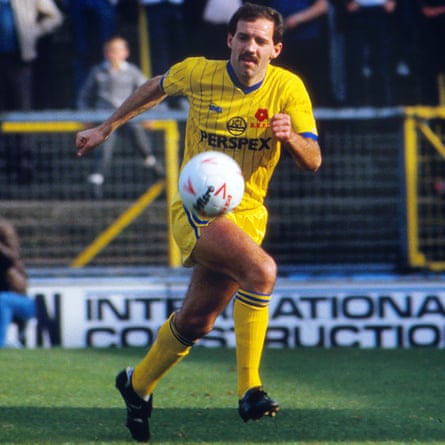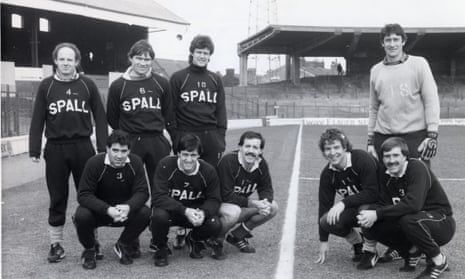Back in winter 1985, no one kicked up much of a fuss when it was announced that Manchester United’s FA Cup fifth round match away at Blackburn Rovers would be screened live on BBC1. Firstly, it wasn’t the 57th time in a row that TV executives had decided to screen Manchester United in the Cup; and secondly, the match between the Division Two leaders and Ron Atkinson’s unreliable United team looked to have all the ingredients of a potential FA Cup giantkilling.
For one man, though, the night would not turn out as he would have hoped. Blackburn’s Mick Rathbone had experienced a few highs and lows in his career before 7.21pm on Friday 15 February 1985, yet, at that precise moment, he probably wanted the frozen Ewood Park pitch to swallow him up. For his very public mistake would prove costly, allowing Manchester United to clear a tricky obstacle on their ultimately glorious Cup run.
Life in the professional game had been tough at first for Rathbone. “I joined Birmingham City, my hometown club, from school,” he says. “They were in the top division at time. I made my league debut at 17 but struggled being a fan and a player. I fell out of love with the game and had crippling performance anxiety. I wanted to pack it in but Jim Smith persuaded me to go on a month’s loan to Rovers.”
The move was crucial for Rathbone. “It all changed there and I felt wanted and important. I begged Brum to let me stay there full-time. They weren’t keen at first but relented and sold me for £40,000.” Despite this new security, Rathbone very nearly threw away his opportunity at Ewood Park, clashing with manager Howard Kendall over his lack of discipline off the pitch.
“At the start of my first full season, me and Russell Coughlin were in digs together,” Rathbone explains. “We were both young and away from home, and just enjoyed ourselves a bit too much.” Rathbone’s physical condition led to Kendall suspending him for three months, but in this time Rathbone met his future wife, Julie, who put him on the straight and narrow path to fulfilment.

By 1985, Rathbone was part of a Blackburn team that seemed to be going places under Saxton. They were top of Division Two, had lost just one match at home, had scored in every league game and were both well organised in defence and exciting attack, with wingers Noel Brotherston and Ian Miller proving the flair. Eight members of the squad had made more than 100 appearances for the club – including club legend Derek Fazackerley, who would play for Blackburn 674 times before leaving the club in 1987 – so they didn’t lack experience.
“We had a great team spirit,” says Rathbone. “Big hearts and desire and some decent players. We all loved that club. We loved Bob Saxton. He was a terrific manager. Tough but fair and a great man manager.”
Blackburn had to take on fellow Division Two high-flyers Oxford before the winners could claim the grand prize of Friday night live coverage against Manchester United in the fifth round. For the cash-strapped Lancastrians, the income from the BBC would be extremely welcome. Therefore, Jimmy Quinn’s winner against Oxford, and Terry Gennoe’s penalty save from Bobby McDonald, left the board, management and players delighted.
With a sell-out crowd of 22,692 joined by fans outside the ground trying to catch a glimpse of the action, hopes were high for a shock. “We knew we could at least give them a scare,” says Rathbone. “We had the home advantage and a good team.”
What Blackburn needed was a solid start. Sadly for Rathbone, his slip after just six minutes gave United a precious early lead. Attempting to pass the ball back to his goalkeeper, Rathbone trod on the ball, allowing Gordon Strachan the opportunity to chip United in front. “The rubber-coated ball got stuck under my foot,” Rathbone explains. “Every time I saw Strachan over next the 30 years he would hug me and thank me for helping his Manchester United career take off.”
Strachan’s 18th goal of his debut season in England eased United’s nerves and, although Blackburn threatened through Quinn, Chris Thompson and substitute Simon Garner, Gary Bailey stood firm in goal for the visitors. Strachan missed an ideal chance to put the game to bed, blazing over an 81st-minute penalty, but with just a couple of minutes remaining, Paul McGrath surged through the midfield – aptly wearing the No7 shirt of the absent Bryan Robson (who was recovering from a dislocated shoulder) – and the newly capped Irish international bundled the ball past Gennoe to clinch United’s place in the last eight.
“I was mighty relieved when McGrath scored their second,” says Rathbone. “Everybody was great. There were no recriminations. I was a good player for Rovers and popular with the fans.” United went on to win their quarter-final with West Ham, take part in an epic double-header with Liverpool and pull off a 10-man victory over Everton in the final. But for the defeated Blackburn there would only be pain.
Perhaps suffering from a hangover after the United match, Blackburn lost their next three games and ended the season one point short of automatic promotion. Rathbone believes they suffered as their squad was tiny but, either way, Blackburn never reached such heights again under Saxton. They finished 19th the next season and, by December 1986, Saxton was gone.
Under Don Mackay, Blackburn won the Full Members Cup final at Wembley in 1987, but for the recently injured Rathbone there was only disappointment at missing out on the experience, as Chris Sulley retained his place in the team. “It was the best of days and the worst of days, to quote that bloke in A Tale of Two Cities,” says Rathbone. “It made me decide to leave and go to Preston, which I loved too.”
Rathbone stopped playing aged just 32, but his early retirement gave him an opportunity to move into a new field. “I wanted to be doctor when I was at school but left at 16 to join Birmingham City. When I finished at 32 it was too late too train to be doctor, so I went to Salford Uni to be physio and I have been lucky to have been very successful.” Stints at Halifax Town, Preston and Everton followed, and Rathbone is now head of the medical department at Wigan Athletic.
Rathbone is remarkably relaxed about his mistake on that cold night in February 1985. “I felt OK,” he says. “It’s just part of game. As Bob Saxton famously said after the game: the name of Mick Rathbone is now known all around the world.”

Comments (…)
Sign in or create your Guardian account to join the discussion